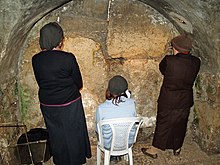Jerusalem in Judaism
[3]Maimonides cites various reasons why this is so, the first being that if the nations of the world had learned that this place was destined to become the centre of the highest religious ideals they would have occupied it to prevent the Jews from ever controlling it.
The Temple was central to the Three pilgrim festivals, namely Passover, Shavuot and Sukkot, when all Jews were incumbent to gather in Jerusalem.
A number of fast days including the Ninth of Av, the Tenth of Tevet and the Seventeenth of Tammuz, all recall the destruction of the Temple.
Blessed are you God, who restores His presence to Zion".In the Grace After Meals which is recited after partaking of a meal eaten with bread, the following is said: "Have mercy Lord, our God...on Jerusalem Your city, on Zion the resting place of Your glory, on the monarchy of King David Your anointed, and on the great and holy Temple upon which Your name is called...Rebuild Jerusalem, the holy city, soon in our days.
Bring us up into it and gladden us in its rebuilding and let us eat from its fruit and be satisfied with its goodness and bless You upon it in holiness and purity.”Some Jewish groups observe several customs in remembrance of Jerusalem.
A tiny amount of ash is touched to the forehead of a Jewish groom before he goes to stand beneath the bridal canopy.
The well-known custom of the groom breaking a glass with the heel of his shoe after the wedding ceremony is also related to the subject of mourning for Jerusalem.
Another ancient custom is to leave a patch of interior wall opposite the door to one's home unpainted, as a remembrance of the destruction (zecher lechurban), of the Temples and city of Jerusalem.
According to Jewish law, as an expression of mourning for Jerusalem, it is forbidden to listen to any form of music, other than on holidays and at celebrations such as weddings and inaugurations of new Torah scrolls.
The Western Wall (kotel hama'aravi), in the heart of the Old City of Jerusalem, is one of the holiest sites in modern Judaism.
However, the capture of Eastern Jerusalem in the Six-Day War revealed that the retaining wall of the Temple Mount in fact survived in all places.
urged a peaceful surrender, in order to save Jerusalem from destruction, but was not heeded as the city was under the control of the Zealots.
Jewish legend relates that as he came near Jerusalem, overpowered by the sight of the Holy City, he sang his most beautiful elegy, the celebrated "Zionide" Tzion ha-lo Tish'ali and that at that instant he was ridden down and killed by an Arab.
In the 18th century, both the Vilna Gaon and Baal Shem Tov instructed and sent small successive waves of their disciples to settle in Jerusalem, then under Turkish Ottoman rule.
Jerusalem in the 21st century is perceived by Israeli Jews in different ways, depending on their religious beliefs.
In the summer of 2009, riots by Haredi Jews broke out in Jerusalem over the opening of a parking lot near the Old City on Saturdays.
Jerusalem, one of the few remaining unifying concepts in our deeply divided Jewish world, may serve as precisely such as symbol.

